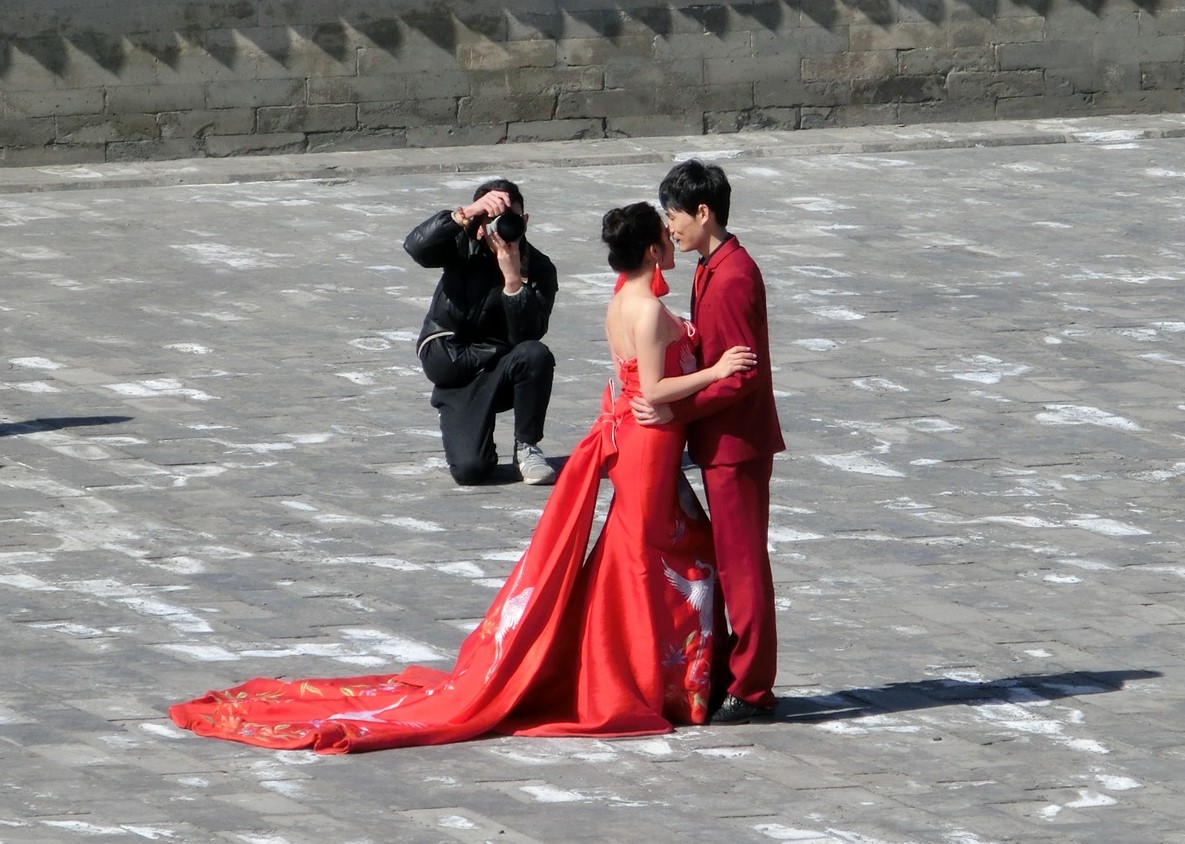[Global Series: Marriage and Assets] Hong Kong: Preparing for Marriage
- Release date: Oct 05, 2022
- Update date: Oct 14, 2025
- 4097 Views
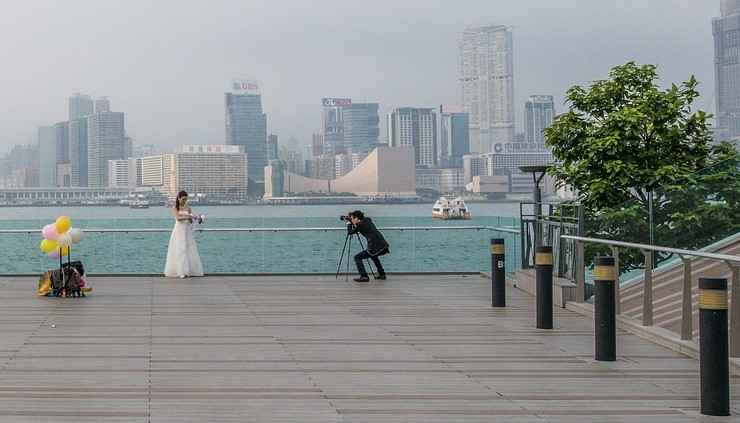
Having found a lifelong partner, they stand at the threshold of a new beginning. This article introduces Hong Kong's marriage customs, including the significant decisions and substantial expenses involved in this major life event, while also covering local traditions.
Expenses Necessary for Marriage
According to Hong Kong's online media outlet “Lifestyle,” the average expenditure for weddings in 2021 was HK$351,823 (approximately ¥6.17 million). The breakdown was as follows: wedding banquet (HK$144,917, approx. ¥2.54 million), wedding accessories (HK$93,081, approx. ¥1.63 million), honeymoon (HK$41,276, approx. ¥720,000), commemorative photos (HK$19,986, approx. ¥350,000), wedding ceremony photos (HK$15,548, approx. ¥270,000), wedding attire (HK$11,915, approx. ¥210,000), and makeup/other (HK$25,100, approx. ¥440,000). Weddings in Hong Kong involve considerable expense. Beyond wedding photography, commemorative photos for the couple are also popular. It's common to see brides in wedding gowns and grooms in tuxedos being photographed around town. Hong Kong has a tradition of “Lai Kung” (禮金), similar to a dowry, where the groom's family typically pays the bride's family an amount equivalent to three months of the groom's salary. As a return gift, auspicious sums like HK$38,888 or HK$18,888 are given. Along with this return gift, auspicious foods, shoes or belts for the groom, and gold are often presented. Gold-related gifts for the groom typically include rings, necklaces, pendants, gold bars, or coins, with the amount and specific items varying by individual. The bride's family may purchase a golden pomegranate for the groom, as the fruit's many seeds symbolize the prosperity of descendants. Gold necklaces may sometimes be inscribed with wishes for health or good fortune.
Building Assets After Marriage
According to an online survey conducted by Hang Seng Bank, a major financial institution, raising a child in Hong Kong until age 22 costs approximately HK$6 million (¥105.68 million), a 55% increase from HK$4 million 16 years ago. Hong Kong's education costs are particularly high for private schools, with tuition fees rising annually. This trend is likely linked to the common practice of studying abroad for university. Furthermore, over 60% of respondents lack sufficient savings to cover their retirement living expenses and medical costs. Data indicates that maintaining a standard of living after retirement requires approximately HK$276,000 (about ¥4.86 million) annually. Consequently, building assets has become a critical consideration for couples who wish to marry and have children. For men, after marriage, they often choose one of three options: purchasing a new home with a loan, moving into a larger apartment with their parents, or renting a room in their parents' home. Hong Kong housing is globally expensive, and rooms are often very small. Those with substantial funds may use a down payment to purchase multiple units, pay off mortgages with rental income, and end up owning several properties with asset value once the loans are cleared. Given high rents, some decide it's better to buy and pay a mortgage than pay rent, choosing to own property as an asset for their later years.
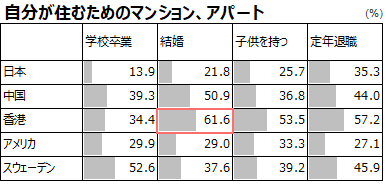
Real estate serves as an investment for Hong Kong residents and plays a significant role in asset formation.
Q7: For each of the following life stages, please select what you would like to have. (1) When you graduate from school and start working (2) When you get married (3) When you welcome your first child (4) When you retire
Source: Intage Independent Survey Survey on Life Events and Assets in 9 Countries) URL: (https://www.global-market-surfer.com/report/detail/152/ ※Survey overview is provided at the end of this document.
Due to the well-developed public transportation network, demand for cars is relatively low, and few people tend to purchase them anticipating asset value.

The car ownership rate is low at 34.4%.
Regarding real estate, which is crucial for asset building, parking lot leases are popular. They require less maintenance than residential properties and are more affordable, so when management companies advertise parking lots, buyers are often found immediately depending on the location. With a high rate of women entering the workforce and many high-earning women, it's common for couples to purchase property jointly or for individuals to already own real estate. Hong Kong lacks generous medical subsidies or a pension system (MPF/introduced December 2000), leading many to discuss asset building for the future with relatives and friends. They consult their parents and seek their support when purchasing real estate or gold. Among these methods, real estate investment is considered the most reliable asset-building strategy. About ten years ago, Hong Kong real estate was prohibitively expensive, but Japanese real estate became an attractive investment target if the exchange rate was favorable. Furthermore, real estate investment isn't limited to Japan; investments in the UK and Canada are also thriving. In recent years, many Hong Kong residents have emigrated overseas. Those with rental income find that moving from Hong Kong to the UK doesn't cause financial hardship, and the desire to obtain overseas visas for their children is also seen as a driving factor behind this emigration trend.
What is Consumer Life Panorama?
This is a website-type database that has accumulated visual data on more than 1,000 sei-katsu-sha from 18 countries around the world. The database includes many 3D models of living environments and 2D data of items owned by each sei-katsu-sha, and is useful for understanding overseas sei-katsu-sha, which is difficult to grasp using only letters and numbers.
Using visual data such as those cited in this column,
Compare the differences in the attributes of overseas consumers
To get a realistic understanding of the actual usage of each category
To understand the overall lifestyle of target consumers
etc., can be utilized as a “no-go” home visit survey.
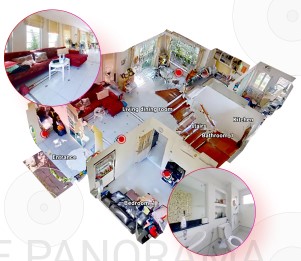
-
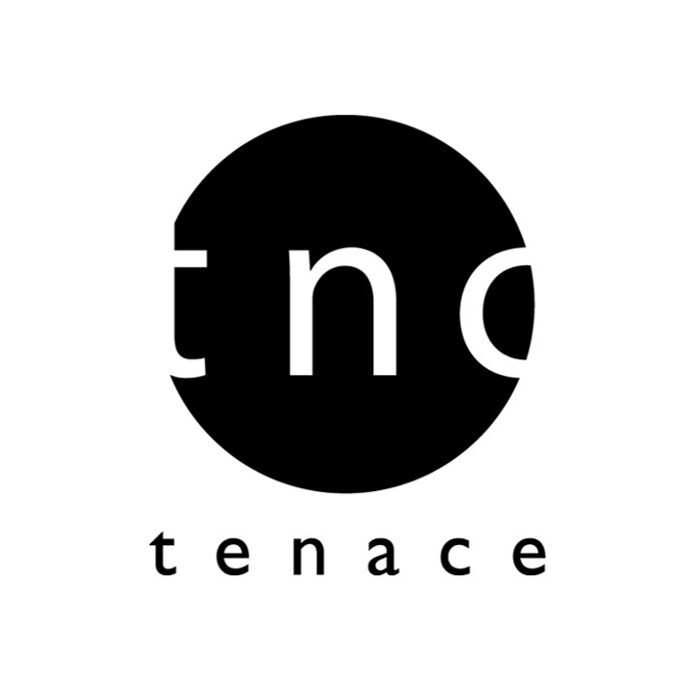
Author profile
TNC Lifestyle Researcher
Lifestyle Researchers, a network of 600 Japanese women residing in 100 regions across 70 countries worldwide, operated by TNC Inc., uncovers trends invisible in statistics and captures authentic voices of consumers. Based on this raw information, we provide proposals for solving corporate challenges and develop product concepts. https://www.tenace.co.jp/ Profile: A researcher in her 40s who has lived in Hong Kong for 26 years and absolutely loves Hong Kong seafood cuisine. She strives daily to find affordable, delicious seafood dishes. I had hoped for a low-key wedding, but somehow ended up having one. Looking back, I'm glad I could show my parents my wedding attire. Since people in Hong Kong value family, I suppose weddings naturally become more elaborate and larger-scale.
-

Editor profile
Chew Fong-Tat
I am a Malaysian researcher. I came to Japan 15 years ago and am still based in Tokyo, sharing insights about Southeast Asia and other overseas markets.
 Global Market Surfer
Global Market Surfer CLP
CLP
